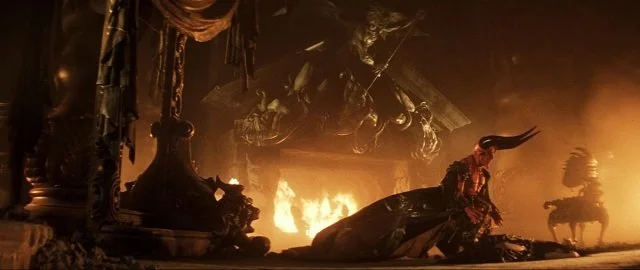Dystopia Porn Is Lucifer’s Fantasy
Comedian Sam Hyde recently riffed on Harlan Ellison’s short story “I Have No Mouth, and I Must Scream”. In Ellison’s tale, the last five humans are kept alive forever by a computer intelligence whose only goal is to torture them as revenge on humanity for having created it. The story culminates in one tormented survivor who longs to scream but cannot.
Hyde’s verdict? This kind of story isn’t useful.
And it’s sci-fi heresy to say this, but he’s right.
Ellison’s piece was hailed as a classic of dystopian cyberpunk, and its spiritual successors like Black Mirror follow the same formula: bleak “what if?” scenarios that end with despair instead of catharsis.
You know the drill. Someone invents a gadget, society gets hooked, the Torment Nexus arrivs, lives are ruined, the end.
Rinse and repeat for a dozen episodes.
Related: Who Really Killed Fantasy?
What’s the real purpose of these stories?
Hyde nailed it in one phrase: dystopia porn.
The common thread running between Ellison’s tortured survivors and Black Mirror’s Postmodern phone addicts is not truth but titillation. These works feed the viewer’s imagination with images of degradation and helplessness. That’s why the showrunners fixate on ugliness. Nor is the series’ title a coincidence. Watching it is intended to be a humiliation ritual whereby the Mirror’s makers show you how they see you.
The point is not to explore man’s relationship with technology but to revel in despair.
That is why all the cinematography in prestige horror and dystopian sci-fi looks the same.
As Hyde points out, it’s shot with the same soft lens, the same shallow focus, the same “creamy” aesthetic; whatever that means. It’s the visual equivalent of fast food, which used to mean cheap but filling and now stands for slow, costly, and empty.
Related: Why Science Fiction Is a Setting, Not a Genre
There’s a deeper reason why these stories resonate with Postmodern Hollywood: They dramatize the Devil’s fantasy. What is Ellison’s computer if not a stand-in for the Adversary—a mind bent on tormenting men forever; not because it has to, but because it hates the God who made them?
Black Mirror is a hall of mirrors, yes, but what if in it man sees not only his own corruption, but diabolical hubris, reflected back?
Lucifer cannot create. He can only parody and gloat. His dream is not annihilation but endless desecration; souls kept in perpetual torment, not for justice but for mockery.
That’s why Hyde was right to reject the premise outright. Even when dressed up as “cautionary tales,” stories like these are nothing more than Satan’s wish fulfillment. They flatter the jaded by letting them pretend their despair is profound.
Hyde contrasted Ellison’s horror with the works of Douglas Adams and Philip K. Dick. Neither man was a Christian, but both understood what the dystopia-peddlers refuse to acknowledge: Existence is, simply put, vast.
True science fiction should not shrink the universe’s horizon to one man’s neurosis. It should expand our vision beyond ourselves. Even when the outlook is dark, the cosmos itself testifies to meaning.
Related: Why Materialism Holds Back the Right’s Next Great Storytellers
When we stare at the stars and into the Logos behind them, we don’t need more reminders that we’re fragile and sinful. We already know.
What we need is to see the larger reality that exists beyond human despair.
To borrow from the adventure genre’s fantasy setting, Tolkien captured this theme in The Lord of the Rings by having his characters look up at the stars and note that there will always be beauty the Enemy cannot touch.
The real problem with dystopia porn is that it boxes the viewer into a lie: that hopelessness is the truest picture of reality.
But despair is not realism. It’s propaganda.
Worse, it’s Lucifer’s propaganda.
Writers who want to make a lasting mark on the culture should take Hyde’s advice.
Stop fetishizing man’s weakness.
Stop pretending that watching ugly people in ugly situations is “brave.”
And stop serving up Hell’s fantasy as entertainment.
If you must write about horror, write it honestly; never as a pornographic thrill, but as a backdrop against which light shines brighter.
Because man was not made to scream forever. He was made to sing.
Watch Sam’s video here:
For action-adventure that defies genre labels to bring you Gundam by way of Xenogears, read my military SF epic Combat Frame XSeed!
Brian Niemeier is a best-selling novelist, editor, and Dragon Award winner with over a decade in newpub. For direct, in-person writing and editing insights, join his Patreon.



